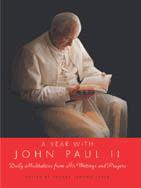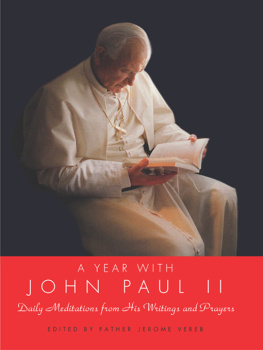Not since the publication of Journal of a Soul, the spiritual autobiography of Pope John XXIII, have we had such privileged access into the spirituality of a pope. This is what we have been given with the publication in English of the spiritual diaries of Pope John Paul II. In Gods Hands has already been published in his native Poland and in Italy where it has been a phenomenal success. English-speaking readers will now benefit from the extraordinary insights of this spiritual journal.
The two notebooks from which it is drawn are not chronological. However, the first covers the years 19621984, whilst the second includes notes at retreats given to the Pope and Roman curia between the years 1985 and 2003. The electrifying element in this publication are the pages of handwritten reflections, explanations and prayers bearing characteristic insights of Pope John Paul II. There is an Ignatian structure to much of his response to the various presentations, homilies, feast days, Liturgy of the Hours and Mass celebrated during the retreats. This structure enables an amazing personal response to take place, with the unique ability to link such thoughts and texts to his own inner life as well as to the public ministry he was called to exercise in the Church and in the world.
In Gods Hands is unusual in that the immediacy of the Popes response is given, not just through his handwriting, but in the deepest thoughts elicited by the presentations of the retreat givers. This is not a sedate, refined or sanitised journal of devotion. It allows the reader to follow the different paths which lay before one who was sincerely discerning the will and plan of God unfolding in his own life.
In all this, the leitmotif of obedience to the will of God is obvious not least in his episcopal motto Totus Tuus. In his devotion to Mary, Pope John Paul II saw someone who was attentive to the will of God, the woman who listened, the woman who believed that Gods plan could be fulfilled through her obedience. By the same token, that obedience, which is based on prayerful listening and the response which follows, was the foundation of the dynamism he was able to bring to the papal ministry.
Prayer is the language of our hope wrote Cardinal Ratzinger, quoted in one of the spiritual conferences eliciting a very full entry in the retreat notes. Herein lies another path to the heart of the love of God when Heart speaks to heart (Cardinal Newman) but always in the silence of the heart. Of course intercession is part of the prayer of Pope John Paul II as he prays for the needs of the world and the Church and all people. But it is in his prayer of adoration and contemplation that he comes to know himself as he is known. This is the path of the mystic, recognising that heaven is... a space that Christ made for man in God (Ratzinger). This is also what allowed the Pope to spend time alone with God in prayer... at the morning watch and even in the night (De profundis). So often, such waiting on God is regarded as a waste of time. The act of faith that gives the time and space to such contemplation says that no time is wasted in which God is served. The service of God is the sanctification of time. No time is sanctified more than when it is a pure gift, given in faith with no other expectation than to be in the presence of God. This is the prayer which permeates these diaries of Karol Wojtya.
There is another language of prayer with which he was intimately familiar: the language of suffering. From the devastating attempt on his life in St Peters Square on 13 May 1981, and the burden of ill health he subsequently bore, suffering was part of the reality of who he was. Old age and increasing infirmity limited his physical resources in ways which were surely both Calvary and cross to this once energetic man and skilled communicator. Even when he could no longer speak, he did not hide himself away from those who came to see and hear him. He had preached often on the meaning of the suffering of Jesus on Calvary and the significance of the cross in the suffering that each person has to bear. Now he was able to personify that teaching in his own weakness and vulnerability. The final pages of his diaries have lost the intensity and vigour of all that went before. It is significant that the last two entries touch closely the heart of his life and ministry: Mary, his patron and hope, standing at the foot of the cross followed by a meditation entitled, Jonah, or the fear of preaching the love of God.
Having stood with Mary in her faithfulness throughout his life and having preached the love of God on the worldwide stage, now was the time to return to the Father. His final words on his deathbed were: Let me go to the house of the Lord (Psalm 122). In the first chapter of the Gospel of John we read of the disciples of the Baptist asking Jesus, Master, where are you staying? Jesus said to them, Come and see (John 1:38). In Gods Hands is a chronicle of one who responded to that invitation in prayer and in faith every day of his life.
+George Stack
Archbishop of Cardiff
Chair of the Department of Christian Life and Worship of the Bishops Conference of England and Wales
We present the reader with a book that covers the content of the two notebooks in which Bishop Karol Wojtya, and later Pope John Paul II took personal notes and recorded his reflections, which related primarily to the retreats and reflection days which he attended between 1962 and 2003.
The text has not been abbreviated in any way. We have attempted to maintain the layout of the notebooks pages, as well as any additional notation: underlining, textboxes, etc.; the marginalia are presented in the same way as in the original notebooks.
The words that were impossible to read are marked as [illegible].
The editorial interventions consisted in the following:
restoration of the chronological order in the entries from the first notebook;
translation of phrases and sentences recorded in foreign languages (mainly in Latin and Italian);
correction of obvious spelling and punctuation mistakes;
expansion of the abbreviations used in the reflections to facilitate reading; if these abbreviations were not easy to decipher, they were retained in their original form.
All editorial insertions are marked by square brackets.
Translators Note
Pope John Paul Ils notebooks were first published in Polish in 2014, and soon afterwards translated into several languages, including Italian, French, German, Romanian and Portuguese. It is a great joy to present the English-speaking reader with this translation. In order to help the reader fully to appreciate the richness of John Paul IIs thought, the English edition provides notes with references to biblical quotations and other important sources used by John Paul II, as well as additional background information on people, places and events mentioned in particular entries. All biblical quotations are given according to the Revised Standard Version Catholic Edition. For other sources, wherever possible, full references are given to the editions used by John Paul II and to existing English translations. When citing from John Paul IIs speeches and homilies delivered in Polish, I used the existing Vatican translations with minor adjustments where necessary. To make the edition more accessible, Latin names of regular prayers and services have been translated into English. The edition has greatly benefitted from Dr Mt Vinces expertise in Latin and Greek, and Dr Andrea Selleris assistance with Italian. I gratefully acknowledge their help.















